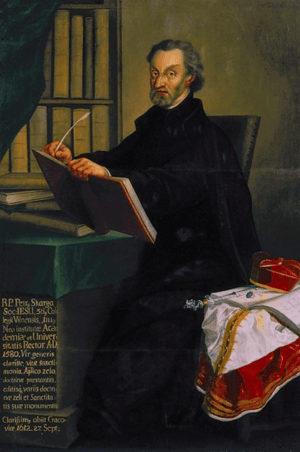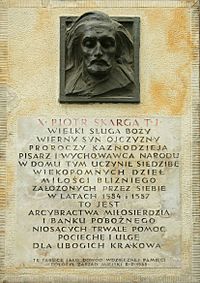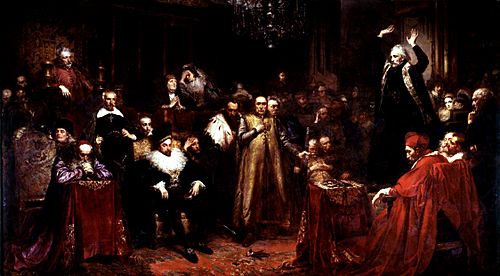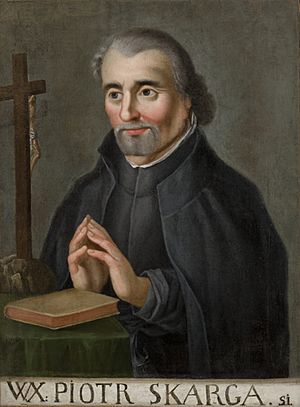Piotr Skarga facts for kids
Quick facts for kids
Piotr Skarga
|
|
|---|---|

Anonymous 17th-century portrait
|
|
| Born | 2 February 1536 Grójec, Kingdom of Poland
|
| Died | 27 September 1612 (aged 76) |
| Other names | Piotr Powęski |
Piotr Skarga (also known as Piotr Powęski) was born on February 2, 1536, and passed away on September 27, 1612. He was a Polish Jesuit priest, a powerful speaker, and a writer of stories about saints. He was a very important leader in the Counter-Reformation in the Polish–Lithuanian Commonwealth. People often called him "the Polish Bossuet" because he was such a great speaker.
Poles remember Skarga as someone who strongly pushed for changes in the Polish–Lithuanian government. He also criticized the way the country was run and its policies on religious tolerance. He believed the king should have more power, and the parliament (called the Sejm) and the nobles (called the szlachta) should have less.
He taught at the Kraków Academy. In 1579, he became the first leader, or rector, of the Wilno Academy. Later, he worked at the Jesuit College in Kraków. Skarga wrote many books. His book The Lives of the Saints (Żywoty świętych), published in 1579, was one of the most popular books in Polish for hundreds of years. Another important work was his Sejm Sermons (Kazania Sejmowe, 1597). This book, which talked about politics, became very popular later in the 19th century. At that time, people saw him as a "patriotic seer" who had predicted the partitions of Poland, when Poland was divided up by other countries.
Contents
Who was Piotr Skarga?
Early Life and Education
Piotr Skarga was born on February 2, 1536. His family lived in a small manor house called Powęszczyzna, north of Grójec. His family was considered minor nobility, but his ancestors might have been peasants or townspeople. Piotr lost his mother when he was eight and his father, Michał Skarga, four years later. His brothers, including Stanisław Skarga, who was a priest, supported him.
Piotr started school in Grójec. In 1552, he went to the Kraków Academy, which is now Jagiellonian University. He finished his studies in 1555.
Becoming a Priest and Jesuit
After finishing school, Skarga worked for two years as a leader at a school in Warsaw. In 1557, he became a tutor for Jan Tęczyński, the son of a powerful noble. He traveled to Vienna with his student. There, he probably learned a lot about the Society of Jesus, also known as the Jesuits. The Jesuits were a key group in the counter-reformation, which was the Catholic Church's response to the Protestant Reformation.
He returned to Poland, where the Catholic Church and the Protestant movement were in a big struggle. Around 1564, he became a priest. He worked as a pastor in Rohatyn and later as a church official in Lwów. From 1566 to 1567, he was a chaplain for a nobleman named Jan Krzysztof Tarnowski. After Tarnowski died, Skarga returned to Lwów and became a preacher at the main church.
In 1568, Skarga went to Rome and joined the Society of Jesus in 1569. He came back to Poland in 1571 and preached in many cities, including Warsaw and Płock. He even visited the court of Queen Anna Jagiellon, who became one of his supporters. Skarga was a strong supporter of the Counter-Reformation. He often preached against non-Catholic religions and helped the Jesuits get money and special rights.

Teaching and Writing
In 1573, Skarga became the leader of the Jesuit College in Wilno, which later became the Wilno Academy (Vilnius University). In 1577, he became a professor at the Kraków Academy. That same year, he finished his important book, The Lives of the Saints (Żywoty świętych), which was published two years later. In 1579, he became the first leader of the Wilno Academy.
Skarga also wrote against the Calvinist author Andrzej Wolan. Their arguments were published in a series of books. Wolan was an important figure in Polish politics, working as a royal secretary and diplomat.
In 1584, Skarga moved to the new Jesuit College in Kraków. In 1587, he started a charity called the Bank Pobożny (Pious Bank), which was like a pawn shop run to help the poor. In 1588, the new king, Sigismund III Vasa, created a special job for a court preacher, and Skarga was the first to hold it. Skarga became a trusted advisor to the King. The King liked him so much that he asked Skarga to stay at court as long as possible.
Later Life and Influence
Skarga strongly supported the Union of Brest. This was an agreement to bring parts of the Eastern Orthodox Church together with the Roman Catholic Church. He influenced King Sigismund, encouraging him to oppose religious tolerance and to make the king's power stronger. Some people believe this influence helped cause a civil war in 1606, called the Zebrzydowski Rebellion. In this war, the king's supporters fought against a group of nobles who wanted to remove Sigismund from power. Some critics even called Skarga "the main troublemaker of the Kingdom."
In 1611, he gave his last sermon to the Sejm (parliament). He also published his last book, Wzywanie do jednej zbawiennej wiary (A Call for One Redeeming Faith). He continued to be King Sigismund's court preacher until April 1612, just four months before he died.
Piotr Skarga passed away on September 27, 1612. He was buried in the Saints Peter and Paul Church in Kraków.
What did Piotr Skarga write?
Skarga was a popular preacher and wrote many religious books and arguments. His fame as a writer has lasted for a long time.
His two most important books are The Lives of the Saints (Żywoty świętych, 1579) and Sejm Sermons (Kazania Sejmowe, 1597). The Lives of the Saints, which tells stories about saints, made him famous during his lifetime. The Sermons, however, became well-known much later, during the Partitions of Poland. This book was a major attack on the idea of religious tolerance that was promoted by the Warsaw Confederation.
The Lives of the Saints was incredibly popular. The first edition sold out quickly. By the mid-17th century, it had been printed twelve times. This made it one of the most popular books in Poland and Lithuania at that time. It was Skarga's most famous work and remained popular until the 18th and 19th centuries, when his Sermons became more recognized.
The Sermons was a political book written like a series of speeches. It was hardly noticed when it was first published. In the Sermons, Skarga talked about what he saw as problems in the Polish–Lithuanian Commonwealth. These included a lack of patriotism, internal fights, allowing "heretics" (people with different religious beliefs), the king having too little power, unfair laws (criticizing the nobles' Golden Freedoms), and bad morals. He also focused on the difficult lives of the serfs, who were peasants tied to the land.
Why is Piotr Skarga important?


Historians have written a lot about Skarga. He is famous for being the most important figure of the Polish Counter-Reformation. Later, his ideas for reform, which were controversial in his own time, became well-regarded during the Partitions of Poland.
His popularity grew in the second half of the 19th century. People saw him as a "patriotic seer" who had predicted the Partitions. Some historians even spoke of a "cult of Skarga." His writings are valued mostly for his ideas about political and social changes, rather than for their religious content.
Since the Polish Enlightenment in the mid-18th century, Skarga's works have also been appreciated for their writing style. He wrote in Polish, not just Latin, and his works helped develop the Polish language and literature. Famous people like the poet Adam Mickiewicz and the painter Jan Matejko admired Skarga. Mickiewicz called Skarga's Lives a "most poetic Polish masterpiece." Matejko created a famous painting called Kazanie Skargi (Skarga's Sermon).
Over the years, Skarga has appeared as a character in many artistic works, including a novel by Józef Ignacy Kraszewski.
In 1936, on the 400th anniversary of his birth, a Polish writer named Zofia Kossak-Szczucka suggested that Skarga should be made a saint. This idea had the support of Poland's President and government. Nearly 80 years later, in 2013, the process to make him a saint officially began.
In 2012, on the 400th anniversary of his death, the Polish Sejm (parliament) declared that year the "Year of the Reverend Piotr Skarga." This decision caused some debate.
Piotr Skarga's Main Works
- Pro Sacratissima Eucharistia contra haeresim Zwinglianam, ad Andream Volanum (For the Most Sacred Eucharist, against the Zwinglian Heresy, 1576)
- Lives of the Saints (Żywoty świętych, 1579, published 8 times during his life).
- Artes duodecim Sacramentariorum, sive Zwinglio-calvinistarum (Siedem filarów, na których stoi katolicka nauka o Przenajświętszym Sakramencie Ołtarza, The Seven Pillars on Which Stands Catholic Doctrine on the Most Sacred Sacrament of the Altar, 1582)
- Sejm Sermons (Kazania sejmowe, 1597, published after his death).
- Soldiers' Devotions (Żołnierskie nabożeństwo, 1606).
- Wzywanie do jednej zbawiennej wiary (A Call for One Redeeming Faith, 1611)
See also
 In Spanish: Piotr Skarga para niños
In Spanish: Piotr Skarga para niños
- Antonio Possevino
- Stanisław of Skarbimierz
- Szymon Starowolski
 | Stephanie Wilson |
 | Charles Bolden |
 | Ronald McNair |
 | Frederick D. Gregory |

